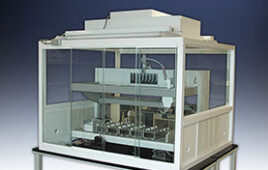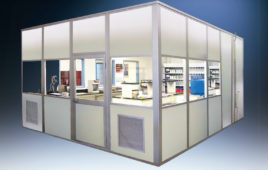A former pharmacy technician at the New England Compounding Center testified last week that speed was prioritized over safety and sanitation when dispensing drugs.
Cory Fletcher stated, “I assume I made a mistake” in his testimony (given under an immunity agreement) on Oct. 30, acknowledging that he possibly forgot to include a painkiller in drugs that he prepared for injection into patients’ eyeballs. Patients at the Massachusetts Eye and Ear Infirmary suffered from a burning sensation in their eyes, following injections that were given prior to cataract surgery or other eye treatments.
While being cross-examined by the defense team, Fletcher said that he still continued to produce the drug even after the eye block error was discovered.
Fletcher said that the eye block issues occurred months before the 2012 meningitis outbreak that killed 64 people and sickened over 700 others across the U.S. The New England Compounding Center compounded steroid injections under, prosecutors say, unsanitary cleanroom conditions. The tainted steroid injections resulted in a fungal meningitis outbreak across several states.
He further stated that the NECC pushed its employees to speed up their process, which oftentimes meant that safety measures were ignored and records were falsified in order to bypass waiting times for proper quality tests.
Fletcher said that production stopped abruptly a few weeks after the faulty eye block incident, after word got out that a patient in Tennessee who had been injected with an NECC steroid had been diagnosed with fungal meningitis. Employees were directed to start a facility cleanup — particularly in the cleanroom where Fletcher had prepared the suspect spinal steroid, methylprednisolone acetate.
Fletcher stated that the cleanup was quickly halted and production began again, but in early October 2012 employees were informed shortly thereafter of a “temporary closure” to the NECC, which quickly became permanent. The employees were told they needed to clear out their lockers.
Assistant U.S. Attorney Amanda Strachan showed Fletcher a series of NECC internal documents, and Fletcher confirmed that less than the normal amount of fluid was added to the methotrexate powder in order to make it seem more potent than it actually was. He also stated that expiration dates were changed on expired drugs so that they could be used.
Read more: Witness: Compounding Center Used Fake Names on Drug Prescriptions
Fletcher also said that nothing was done after environmental tests showed bacteria and mold in his cleanroom.
Also during the trial last week, former pharmacy technician Scott Connolly testified that Sophia Pasedis, then-head of the Massachusetts Pharmacy Board, was in the room during a late 2009 meeting where Connolly was told it was OK for him to work in a pharmacy cleanroom even though he had previously surrendered his technician’s registration.
During that meeting, an official of Ameridose — a sister company of the NECC — informed Connolly that he could be hidden from regulators while working as a pharmacy technician.
Connolly had surrendered his technician’s license prior to taking the NECC job because he stole a prescription drug from his then-employer and sent it to his ex-wife without a prescription. He was subsequently fired from that job and an investigation was launched.
Connolly said that NECC President Barry J. Cadden offered to work with Pasedis to reclaim his registration back, and also said that he used Cadden’s login credentials to enter the NECC computer system in order to conceal his non-licensed status.
Cadden was tried on charges of second-degree murder in 2017 for his alleged role in the meningitis outbreak. He was acquitted of the murder charges, but was sentenced to nine years in prison for racketeering and fraud charges. Connolly also testified at Cadden’s trial.
Connolly further stated that he believed Pasedis served at the same time of the 2009 meeting as the compliance officer for NECC and Ameridose, both of which were closed down as a result of the 2012 outbreak.




